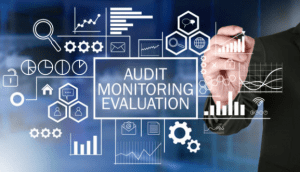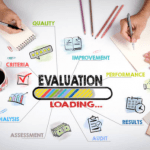10 Reasons Why IT Systems Audits and Reviews are Necessary
You’ve probably heard the phrase If it ain’t broke, don’t fix it before, right? Despite the saying, IT systems audits and reviews are incredibly important to keep your business secure and operational on all fronts—even if nothing seems broken. Here are 10 reasons why IT systems audits and reviews are necessary—and will continue to be in the future.

1) Communicate Better
When you’re a part of an organization, you have a responsibility to communicate with others effectively. From simple emails to more complex business scenarios, there’s a way to handle every situation that will improve your professional image. It isn’t easy, but it is necessary if you want to succeed as an employee.
Here are 10 tips for improving your communication skills in the workplace:
2) Become Efficient
 If you’re having trouble keeping up with all of your daily duties, outsourcing is always an option. Many businesses bring in freelance workers for special projects. But if you’re ready to hire on a full-time basis, make sure you screen every candidate carefully before bringing them aboard. You want to build a team of efficient workers who can help grow your business over time; make sure you know exactly what they’ll be doing each day before adding them to your payroll. Otherwise, you may find yourself struggling with growing pains as new workers struggle to adjust.
If you’re having trouble keeping up with all of your daily duties, outsourcing is always an option. Many businesses bring in freelance workers for special projects. But if you’re ready to hire on a full-time basis, make sure you screen every candidate carefully before bringing them aboard. You want to build a team of efficient workers who can help grow your business over time; make sure you know exactly what they’ll be doing each day before adding them to your payroll. Otherwise, you may find yourself struggling with growing pains as new workers struggle to adjust.
I’m confident these are real byline examples because it would have been more difficult to come up with so many authentic writing samples myself! It gives me some hope that I too could land a byline placement on one of these sites someday…and maybe even snag a few new clients along the way.
3) Reduce Costs
There’s a common saying in business: if you can measure it, you can manage it. The same applies to computer systems. If a network administrator knows how much data is being transferred through a server or how many employees log into which servers at what times of day, for example, then that knowledge helps them make informed decisions about upgrades or redundancies—and keep costs down. In other words, if your company handles sensitive customer information, it makes sense to keep an eye on things. For large companies with complicated IT setups, even frequent internal audits may not be enough to detect every threat. For these companies, third-party audits and reviews by professionals provide a necessary assessment tool. But regardless of size or needs, all businesses benefit from regular audits and reviews by skilled professionals who know their way around systems–because it saves money in maintenance costs, security breaches and downtime losses. Don’t Just Look – Fix It: Good thing audits aren’t just limited to finding vulnerabilities. As part of its review process, auditors should offer suggestions for improving system setup and performance. Often they will recommend preventive measures like moving certain software installations offsite so they aren’t affected by local disasters such as floods or power outages. They might also recommend making important security changesManaged Services such as stronger firewalls or dual passwords before trouble strikes.
4) Follow Best Practices
 It’s easy to overlook critical processes in an organization. When you’re running a business, it can be hard to step back and take a look at what needs to happen behind the scenes in order for your product or service to succeed. When everything is going smoothly, there’s little reason to worry about these functions of a company—but when things go wrong, they tend to go very wrong. Building a plan of action ahead of time can help make sure that you don’t miss anything important during your next systems audit. To get started, think about how technology could break down at any point in its life cycle: from inception to implementation. Then start brainstorming how your current strategy would address each of those potential obstacles. Review regularly: There’s no way around it: You have to spend some serious time reviewing a system before you sign off on its integrity. Even with a perfect plan of action designed upfront, taking periodic reviews is absolutely necessary if you want to protect your data from errors and missteps down the road.
It’s easy to overlook critical processes in an organization. When you’re running a business, it can be hard to step back and take a look at what needs to happen behind the scenes in order for your product or service to succeed. When everything is going smoothly, there’s little reason to worry about these functions of a company—but when things go wrong, they tend to go very wrong. Building a plan of action ahead of time can help make sure that you don’t miss anything important during your next systems audit. To get started, think about how technology could break down at any point in its life cycle: from inception to implementation. Then start brainstorming how your current strategy would address each of those potential obstacles. Review regularly: There’s no way around it: You have to spend some serious time reviewing a system before you sign off on its integrity. Even with a perfect plan of action designed upfront, taking periodic reviews is absolutely necessary if you want to protect your data from errors and missteps down the road.
5) Check Continuity
There’s something comforting about knowing you can rely on your IT system to be there for you. However, if that system doesn’t work then its very existence becomes pointless. A regular audit will ensure that everything is running smoothly, spot any issues before they turn into catastrophes, and give you peace of mind that your business is protected. Not convinced? Call us why you should consider an IT systems audit in 2021. #Audit #ITAudit #ITReview #ITSystems
6) Protect Your Business
 While it might be tempting to get things done without an audit or review, know that, in addition to being a legal requirement, auditing your IT systems can help you identify weak points before they have a chance to sabotage your business. It’s also wise to check in with an audit or review every few years—technology is changing at breakneck speed, so it only makes sense that your systems need re-evaluating on occasion as well. Finally, audits and reviews won’t just protect your business from litigation; they can also help ensure compliance with industry standards. Do these checks, and you’ll not only look good to customers and partners; you might even improve efficiency by uncovering systems that simply aren’t up to snuff.
While it might be tempting to get things done without an audit or review, know that, in addition to being a legal requirement, auditing your IT systems can help you identify weak points before they have a chance to sabotage your business. It’s also wise to check in with an audit or review every few years—technology is changing at breakneck speed, so it only makes sense that your systems need re-evaluating on occasion as well. Finally, audits and reviews won’t just protect your business from litigation; they can also help ensure compliance with industry standards. Do these checks, and you’ll not only look good to customers and partners; you might even improve efficiency by uncovering systems that simply aren’t up to snuff.
7) Improve Efficiency
Corporate fraud can be devastating to your business’s reputation. When users see that they aren’t able to trust you, they stop doing business with you. Unfortunately, fraud is very easy for malicious employees to commit, so it’s essential that every business has an IT systems audit and review policy in place. Without one, dishonest people will always find a way to steal from your company—and your reputation will suffer as a result. You should perform audits on a regular basis—at least once a year—to make sure your network is free of any potential data breaches or hacking attempts. In addition, spot-check your staff members periodically just to make sure there isn’t any corruption going on behind closed doors. Do whatever you need to do to ensure security. If you don’t have security measures in place, then you might as well kiss your credibility goodbye!
8) Create Security Without Compromising Productivity
 It’s not fun to think about, but if your business relies on other people’s money (and it almost certainly does), then you should think carefully about how your business will hold up in a worst-case scenario. If you don’t want to lose clients or customers, consider getting an annual audit or review of your company’s technology infrastructure so that you know exactly where potential flaws lie. This doesn’t necessarily mean that you need to rush out and buy new hardware; you may simply need someone who understands security protocols thoroughly enough to evaluate their merits for your organization. Not only will reviewing your systems make them more secure but doing so regularly can also help maintain existing systems and prevent problems down the road. And even if you do think you have every aspect of your system covered…have some contingencies just in case—you never know when a fire alarm might be pulled on you!
It’s not fun to think about, but if your business relies on other people’s money (and it almost certainly does), then you should think carefully about how your business will hold up in a worst-case scenario. If you don’t want to lose clients or customers, consider getting an annual audit or review of your company’s technology infrastructure so that you know exactly where potential flaws lie. This doesn’t necessarily mean that you need to rush out and buy new hardware; you may simply need someone who understands security protocols thoroughly enough to evaluate their merits for your organization. Not only will reviewing your systems make them more secure but doing so regularly can also help maintain existing systems and prevent problems down the road. And even if you do think you have every aspect of your system covered…have some contingencies just in case—you never know when a fire alarm might be pulled on you!
9) Minimize the Risk of Reputational Damage
It’s easier than ever for unhappy customers to voice their opinion. If you work in an industry with review sites like Yelp, TripAdvisor, Google Places (or if you offer products or services that could be negatively reviewed), make sure your company is getting proactive feedback from clients about their experience. You can usually buy software to collate these reviews; taking time to read through them will give you a good idea of where your business stands against competitors. Many companies have found opportunities for improvement just by reading through customer reviews! As long as people are talking about you—whether it’s good or bad—make sure they’re talking about you because they love what you do. That means implementing feedback-driven improvements so client satisfaction stays at its peak. Plus, fewer problems often mean fewer lawsuits down the road. With all that time saved not dealing with disgruntled clients or fighting off lawsuits, you’ll be able to focus on growth and improvement, which leads us to our next point…
10) Maintain Compliance with Industry Standards
 The easiest way to make sure you’re compliant with industry standards is to hire a third-party company to conduct an audit of your systems. These audits will help ensure that your systems are in line with industry standards, all necessary updates have been applied, and that proper cybersecurity policies have been put into place. A good auditing service should also offer valuable insights into ways you can enhance your security practices, improve efficiency, and eliminate wasted resources. If there’s any question as to how up-to-date your system really is, consider outsourcing your review so you can be certain it meets industry standards and recommended best practices. As an added bonus, many companies require businesses to undergo compliance audits prior to receiving contracts. An external compliance assessment helps demonstrate that you’re aware of (and committed to following) necessary regulations and guidelines. In general, it always pays to keep abreast of potential regulation changes—by keeping informed about new standards, you’ll minimize unexpected pitfalls down the road. Remember: You don’t want to deal with fines or other regulatory action because you were unaware of recently implemented guidelines.
The easiest way to make sure you’re compliant with industry standards is to hire a third-party company to conduct an audit of your systems. These audits will help ensure that your systems are in line with industry standards, all necessary updates have been applied, and that proper cybersecurity policies have been put into place. A good auditing service should also offer valuable insights into ways you can enhance your security practices, improve efficiency, and eliminate wasted resources. If there’s any question as to how up-to-date your system really is, consider outsourcing your review so you can be certain it meets industry standards and recommended best practices. As an added bonus, many companies require businesses to undergo compliance audits prior to receiving contracts. An external compliance assessment helps demonstrate that you’re aware of (and committed to following) necessary regulations and guidelines. In general, it always pays to keep abreast of potential regulation changes—by keeping informed about new standards, you’ll minimize unexpected pitfalls down the road. Remember: You don’t want to deal with fines or other regulatory action because you were unaware of recently implemented guidelines.
While a traditional compliance audit may seem like a major investment, these assessments actually represent one of today’s more affordable business solutions
Contact us to get started!







